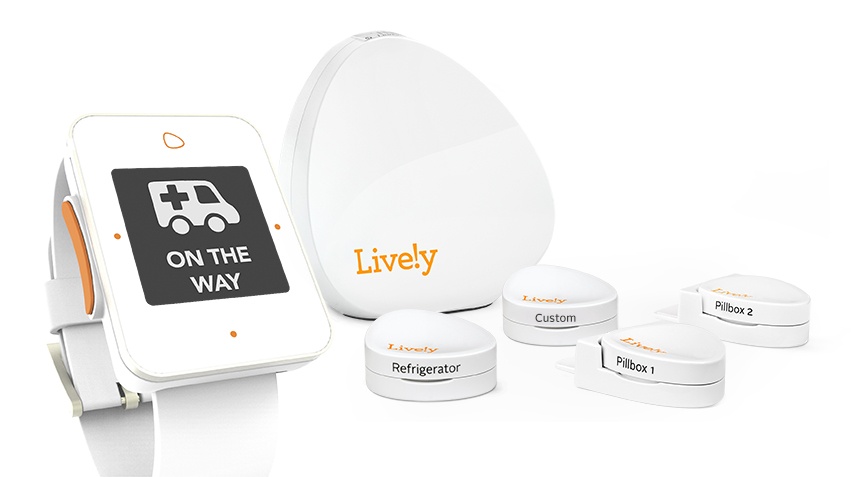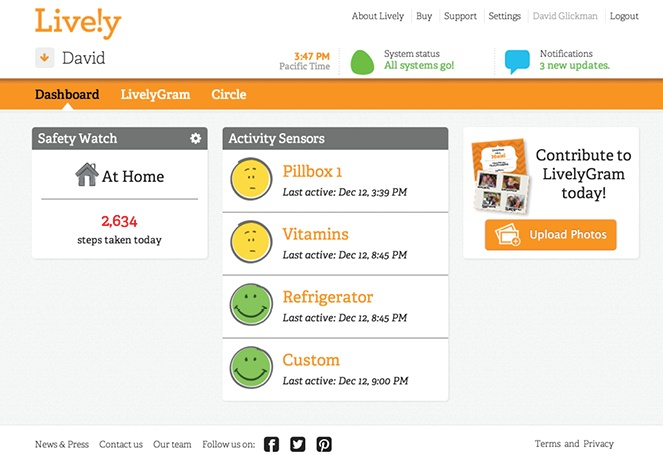With mHealth technology placing a renewed focus on getting the most out of home health care, the time is better than ever for excellent at-home elder care. More and more, seniors are choosing remote monitoring over assisted living or in-home care, allowing them to age in their own spaces, on their own terms. Now is a great time, then, to spotlight one of the mHealth tools that is taking a senior-focused approach to safety and healthy living.
Lively is a medical alert system comprised of a central "hub," in-home activity sensors and a safety monitor watch, all of which work together to create comprehensive in-home monitoring. The system doesn't require an internet connection or link to a home phone line within the user's home, but is activated and monitored online by a remote family member or caregiver.
After plugging the Lively hub into a wall outlet, place the activity sensors throughout the user's home. Lively's recommendations include placing one sensor on the fridge or a pillbox. As long as the sensors are attached to a movable object that's part of the daily routine, the system will be able to do its job. These sensors keep track of daily activity patterns and give family members a heads-up if senior users break their pattern of normal behavior, without video monitoring that would infringe on users' privacy.
The sensors work alongside the safety watch to give medication reminders--if a pillbox sensor hasn't been activated one day, the user will receive a watch alert, and family members with access to the online dashboard will be able to see as well. The online dashboard also allows family members to see if their senior user is wearing their watch, what their daily mobility level is, and which specific sensors have been activated in the home. Monitoring family members can set up text and email notifications and connect the service to their own smartphone as well.
The safety watch is waterproof and also acts a help call button, which connects to the team of 24/7 operators Lively has on staff. The live operators can reach the senior user by phone before calling family members or dispatching emergency services. According to Lively's website, an automatic fall detector should be part of the Lively watch in 2016.
Currently, Lively's safety watch only works within the hub's range--aka, only within the home. Since this is where most falls happen, and there are typically people around to assist in outside-the-home situations, Lively is an effective solution for seniors who live independently but may be at a risk of falling. However, the company plans to develop a smartphone-based hub for 2016 that will make the service mobile and allow users to call for help using the watch, even if they're out of range from their home hub.
mHealth has been underutilized in elder care simply because the devices on the market don't match senior needs. According to a report by the AARP, 77% of seniors surveyed agreed that an activity and sleep tracking wearable device was useful. However, less than half of study participants planned on using a tracker in the future, with many abandoning their device partway through the study. Simply put, most wearable health trackers on the market aren't comfortable or intuitive for seniors, and don't fill their health monitoring needs. Lively, on the other hand, focuses on senior needs, and enables family members to be a part of monitoring without a lot of costly setup or complicated equipment.
The initial cost of Lively's equipment package is $49.95, with monthly plans and pay-as-you-go options for the company's services. Though it does not require a cell phone for use, Lively does work via cellular signals, so those in areas with particularly poor cell connections may want to look at a coverage map and, at the very worst, take advantage of Lively's full refund policy.
As aging in place becomes more and more important to the health community, mHealth technology will continue to focus on senior needs. Today, Lively is blazing that trail and shaping the future of elder care.
What company or device should we choose for next month's mHealth Spotlight?
Let us know in the comments!







